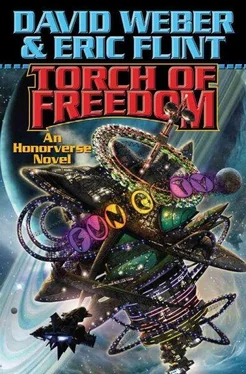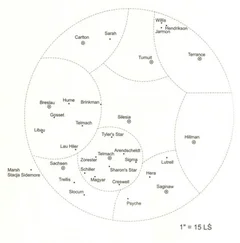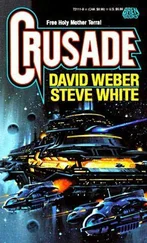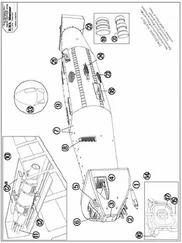Rozsak would have preferred to launch them even more rapidly—to get all of them out of their suddenly imperiled pod bays. They would have fallen steadily astern at Hammer Force's still mounting velocity, and they would have been vulnerable to proximity kills, but that would still have been better than what his tightly knotted stomach muscles knew was about to happen.
Unfortunately, they didn't have the endurance. They were still the original, lightweight pods, and they had to launch their missiles almost instantly. He couldn't hold them back, and twelve seconds was about the tightest window for effective fire control he could manage, especially since his cruisers were going to have to take the missiles under control in successive waves.
The good news—such as there was and what there was of it—was that the minimum cycle time on a Flight VII Indefatigable -class battlecruiser's SL-13 shipboard launchers was thirty-five seconds. The earlier Indefatigables , with the older SL-11-b had the same theoretical cycle rate, but their feed queues were infamous for breaking down if they were pushed much above one launch every forty-five seconds. And as he watched the seconds ticking down, he realized at least some of those ex-Solarian ships had to be Flight V or Flight VI. Thirty-five seconds came and went, and still no second salvo had launched. It had to come any time now, though, and—
There! The second salvo had finally launched, but three of Rozsak's missile waves were already slicing downrange, and more were punching steadily out of Masquerade and Kabuki .
* * *
Adrian Luff's lips skinned back from his teeth as his first salvo went slamming back at his pursuers. He had no illusions about what multidrive missiles with their enormous laser heads would do to his battlecruisers, but he'd gotten at least several seconds' headstart on the bastards, and they'd been coming straight up his wake for the better part of an hour. There'd been plenty of time for Stravinsky and the tactical officers aboard each of the PNE's battlecruisers to mark their targets, track them, run constantly updated firing solutions on them.
Of course, the long range was going to work against their targeting solutions. There was no help for that, and he had no doubt that accuracy was going to be poor, to say the least. But those were only heavy cruisers behind him, not battlecruisers. If he could get his initial salvos in among them, rip up their control systems, knock back their fire control . . .
"Enemy missile launch!" Stravinsky announced, and Luff's jaw muscles tightened. They'd been quicker off the mark than he'd expected, and MDMs had high acceleration rates. If Gowan Maddock's intelligence reports were accurate, they'd be quicker than his Cataphracts' primary drives, even over relatively short ranges, and—
"Estimate three hundred and sixty inbound," Stravinsky continued. "Acceleration rate four-five-one KPS-squared. Time of flight, two-one-seven seconds. Missile Defense is tracking and Halo is active."
Luff's eyes narrowed. That acceleration was lower than he'd expected—in fact, it was lower than his own birds' primary drives, far less the final sprint drive! That meant his flight time was going to be lower than theirs, not higher!
"Second wave launch!"
Damn! They were punching the damned things out at twelve-second intervals! At that rate, they'd be putting better than three salvos into space for every one he sent back at them! That was close to three missiles for each of his.
"Maximum rate fire," he said harshly.
"Maximum rate fire, aye, Citizen Commodore."
Luff sensed Millicent Hartman looking at him and looked up from the plot to meet her gaze.
"Better we risk jamming the tubes than let them pound us any harder than we have to," he told her.
* * *
Hundreds of missiles sliced through space towards one another, each of them a suicidal cybernetic agent of destruction, and their intended targets' defenses roused, dueling with their onboard sensors. Electronic warfare systems tried to blind them while others tried to trick them with false targets, and their own penetration aids did the same thing for the anti-missile targeting systems trying to lock them up. Mighty computers aboard the ships which had launched them—or, in Hammer Force's case, taken them under control after someone else launched them—monitored their telemetry links, adding their own enormous computational power to the titanic struggle. The defensive systems had more power, better AIs, and the advantage of human intuition, but starships were far bigger and far more brilliant target beacons. To offset that, the offensive telemetry links got progressively more arthritic as the attack missiles neared their targets. Exactly when to cut the control links and leave the shipkillers to their own rudimentary devices was always a judgment call, and at the next best thing to thirty-seven light-seconds' range, even the best light-speed fire control fell further and further behind the curve.
By the time Adrian Luff's first missile wave reached attack range of Hammer Force, the PNE had sent six more on its heels . . . and the Solarian ships had put seventeen salvos of their own into space.
* * *
Luff's face was expressionless as he watched that incredible thicket of missiles coming at him. Their icons dusted the plot, and it was already evident that the other side's EW was better than his. Not as much better as the People's Navy had become gallingly accustomed to against the Manties, perhaps, but still at least marginally better.
Still more hostile missile traces appeared in the plot with deadly, metronome precision, and his eyes narrowed.
"Targeting change," he said flatly. "Go for the cruisers."
"First salvo is already committed, Citizen Commodore," Citizen Lieutenant Commander Stravinsky replied. "Retargeting second salvo now."
Luff nodded, his eyes never leaving the plot. He hadn't counted on how rapidly they'd be rolling those waves of pods. He'd hoped he could kill the ammunition platforms before they got very many missiles into space, cut the hostile fire off at the source. Unfortunately, he no longer had time for that. Taking out the freighters would still be worthwhile, but with so many shipkillers already headed his way, it was more imperative that he beat down the enemy's fire control, first.
* * *
Luff's first salvo roared in on Hammer Force.
The cruisers and destroyers shuddered with the sawtoothed vibration of counter-missile launchers in rapid fire. They didn't have the massive armor, the multiply redundant control systems, of ships-of-the-wall, but they'd been designed and engineered specifically to face a massive missile threat. Luiz Rozsak had never anticipated exposing them to a storm like the one racing towards them—not without many more consorts to share the defensive load—but he and the Erewhonese designers working with him had visualized the missile environment far more accurately than the Solarian designers of Luff's Indefatigables .
X-Ray-Charlie Three was still coming fully online. There hadn't been time to complete the redeployment it envisioned, but the cruisers responsible for managing Hammer Force's defensive fire in the outer defense zone were up and tracking. Counter-missiles raced outward, using their hugely overpowered impeller wedges to sweep holes in the incoming fire. But the sudden burst of speed from the Cataphracts' second-stage "sprint drive" had taken Rozsak's tactical officers by surprise. None of the fire control solutions had allowed for it, and kill percentages in the outer zone were less than half of what they ought to have been. Far too many of the first salvo's shipkillers broke past the outer intercept zone, and more counter-missiles erupted from the destroyers tasked to back up the cruisers as they raced into the middle intercept zone.
Читать дальше












